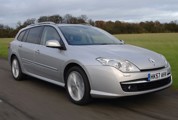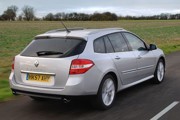Review
I suppose we’d better get the quality issue out of the way first. In the week I had the Laguna Sport Tourer, nothing went wrong.
No lights flashed warnings at me, no pieces of trim came loose and the keycard unlocked it every time.
What this means for the future of the car is difficult to say, as seven days and about 500 miles is not exactly a vehicular lifetime, but I am not exaggerating when I say this is an unusual, and welcome, occurrence in my history of driving Lagunas and Meganes.
I reckon I’ve had more than my fair share of limp-home incidents over the years.
This legacy haunts Renault and the Laguna brand, to the point that this model will keep paying for the misdeeds of the last generation.
A senior leasing industry executive I spoke to the other week said he thought the new Laguna was much, much better than the last one, and seemed well screwed together.
But for the time being, he would be keeping a watching brief, with conservative residual value and contingency-laden SMR estimations, and not getting too excited.
Yet.
So this time next year, after many thousands of miles in many thousands of Lagunas, we will have our answer. Will Renault have made that big leap?
As my old gran would say, you can only speak as you find and the new Laguna Sport Tourer impresses on a number of counts.
First off, the 1.5-litre dCi engine handles with the assured mediocrity of any saloon or estate in this sector – excepting the Ford Mondeo and Mazda6.
The interior feels solid enough, though it has not exactly set my heart aflutter.
But my brain is not wired to use that keycard, which I kept losing in pockets.
Also, I found the seating position odd. It’s a really personal thing, and one person’s armchair is another’s torture rack, but the seat squab felt as though it was tipping forward and I ended up having to sit with my limbs stretched out to be anywhere near comfortable.
As for the estate part of the Laguna, you can’t fault it. Its design works better than the less inspiring hatchback and I can report that 18 square metres of oak flooring can be swallowed with disdainful ease – in boxes, not laid out flat, I should add.
The rear seats flip down flat with a quick and easy flick of two levers allowing nearly 1,600 litres of boot space.
It’s not the sector leader, being more than 100 litres shy of the voluminous Honda Accord, but with a perfectly flat floor and sides with no intrusions, every last inch can be used.
Up front, it’s a decent enough car without being brilliant, while in the back, company car drivers who need usable space should certainly give it a look.
For fleet managers, it seems the Laguna is finally on the path to redemption.
Positive points
- Low running costs
- Good build quality
- Practical load bay
Negative points
- Seating position
- That infernal keycard
- Legacy of last Laguna
Three rivals to consider
- Ford Mondeo estate 1.8 TDCi 100 Edge
- Peugeot 407 SW 1.6 HDi 110S
- Volkswagen Passat estate 1.9 TDI S
P11D price
All four estates are at the lower end of their ranges. In terms of luggage capacity, the Mondeo has the largest volume with a maximum of 1,733 litres, followed by the Passat at 1,641 litres.
The Sport Tourer and SW are more “lifestyle” estates with lower volume carrying ability.
407: £17,053
Passat: £17,277
Laguna: £17,335
Mondeo: £17,730
Emissions and tax rates
Renault’s dCi diesel engines are always impressively low when it comes to emissions and frugal in terms of fuel economy, and the Laguna continues that legacy.
However, the tax brackets being shaped the way they are from April negates its advantage slightly.
Laguna: 133g/km/18%
407: 148g/km/20%
Mondeo: 154g/km/21%
Passat: 154g/km/21%
SMR cost
All four cars are extremely close in terms of service, maintenance and repair.
The 407’s 1.6-litre 110bhp engine needs servicing every 12,000 miles while the Laguna needs a visit every 18,000.
The fact that SMR costs for the Laguna are predicted to match the Passat and Mondeo bodes well for it.
Laguna: 3.18 (pence per mile)/£1,908 (60K total)
Mondeo: 3.21/£1,926
Passat: 3.30/£1,980
407: 3.46/£2,076
Fuel cost
Because of its excellent engine, the Laguna has a clear advantage, with a fuel bill nearly £300 less over 60,000 miles than the next best thanks to official combined economy of 56.5mpg.
Its rivals are closely matched with the Passat, with its old 1.9 TDI engine, the least frugal.
Laguna: 8.27/£4,962 (pence per mile/60,000 mile total)
407: 8.75/£5,250
Mondeo: 9.05/£5,430
Passat: 9.20/£5,520
Depreciation cost
The Passat is a clear leader in terms of residual value. Its combination of superb image and decent load-carrying ability certainly give it an edge.
The Mondeo fares disappointingly, while the Laguna is much healthier than the old one. The ageing 407 is just holding on too.
Passat: 17.76/£10,656 (pence per mile/60,000 mile total)
Mondeo: 20.21/£12,126
Laguna: 20.26/£12,156
407: 20.76/£12,456
Wholelife cost
In wholelife cost terms, the Laguna is very much back in the hunt for fleet business with strong performances across the board. But the Passat is a long way ahead of the competition, thanks mainly to its residual values. The new Mondeo does averagely and no more.
Passat: 30.26/£18,156 (pence per mile/60,000 mile total)
Laguna: 31.71/£19,026
Mondeo: 32.47/£19,482
407: 32.97/£19,782
Verdict
The new Laguna is a big step up for Renault, and any driver looking for a new estate car will have to put a visit to a Renault dealer in their schedule because, on all fronts, this car competes with the best in the class.
But in this test, it is hard to ignore just how far ahead the Passat is.
It may not have the equipment levels of the others, and the engine is a little older and slightly less refined, but it has the interior space and is cheap to run.
- WINNER: Volkswagen Passat estate 1.9 TDI S















Login to comment
Comments
No comments have been made yet.